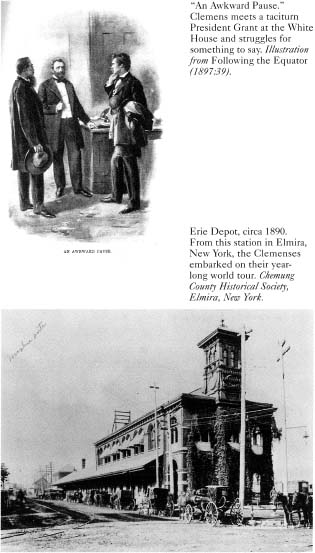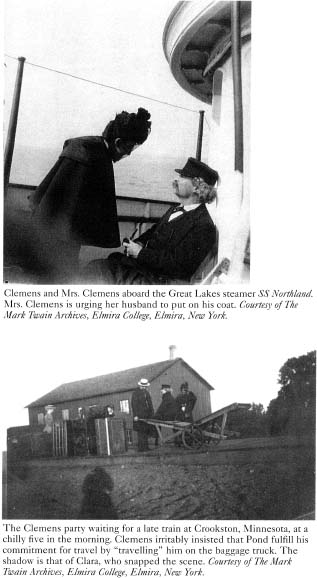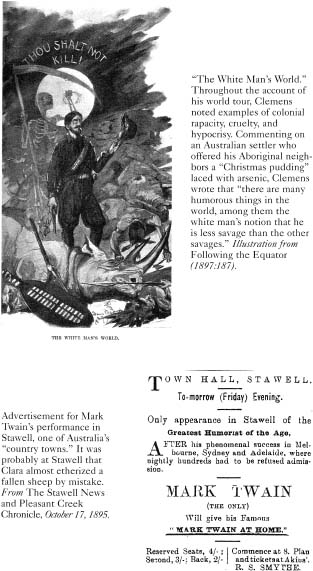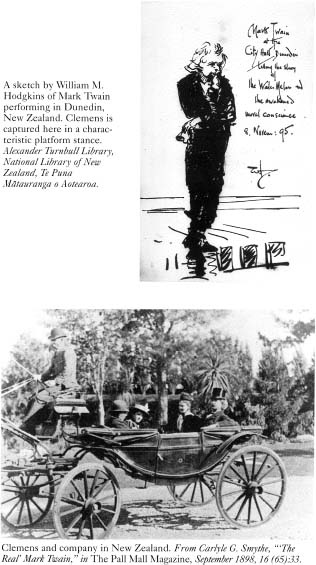
CLEMENS DESCRIBED THEIR VOYAGE to Sydney as “three days of paradise. Warm and sunny and smooth; the sea a luminous Mediterranean blue … One lolls in a long chair all day under deck-awnings, and reads and smokes, in measureless content.” Perhaps his love of sailing mitigated the “swelling seas and cloudy skies” reported by the captain upon the ship’s arrival in Sydney. The weather was threatening enough that Clemens could hope for a heavy storm as punishment for “the damnest menagerie of mannerless children I have ever gone to sea with.”
The Mararoa arrived in Sydney at nine on Tuesday morning, December 17, 1895, after a “burster,” a kind of hurricane from the south, had “knocked the mercury down 36 degrees in four hours,” as Clemens observed in his journal. The reporters who met him at the ship disgusted him. “The interviewer,” he told his journal, “is pathetically persistent in trying to worm out of you your ‘impressions’ of N.Z. & her people & audiences, & ‘which city did I like best, there; & which audience; & are the audiences there as quick & bright as in Austral; & which do I think the most remarkable city, Syd or Melb; & which newspapers do I consider the best; but don’t I think them all remarkable['] — & a dozen other questions of the same guilelessly idiotic sort, which only another idiot would answer.” From his first interview in Cleveland, five months earlier, until he landed in Sydney for the second time, Clemens had responded to dozens of interviewers. It’s hard to dream up original and interesting queries, especially in the presence of an incandescent celebrity, so it would not be surprising if by this time Clemens was fed up by his interviewers’ repetitiveness. Here he seems to have been struck by the parochial rivalries that the reporters’ questions suggested. “These towns & people are full of jealousies of each other, & perfectly ready to out with them in print or anywhere.” But Clemens, who valued his good relations with the press, responded suavely No, he said, he had gone through New Zealand so quickly that he had had no time to form an opinion of it. “I thought the people were particularly fortunate in living in a country with such a grand climate.” To illustrate the hazards of jumping to conclusions about a country, he said that if he had left Timaru before the storm he remembered there had subsided, he would have thought Timaru a windy place. He saw no differences, he said, between audiences in New Zealand and those in Australia. As for New Zealand politics, “I have no impressions … if I had, they would just likely be erroneous ones. I don’t think it is right to hurry through a place and form impressions. I have none — no publish-able ones, anyway”
The day after they arrived, Mrs. Clemens and Clara made two calls and found, as Mrs. Clemens wrote her sister, that both families were about to leave town for long periods, both planning a visit “‘home,’ as they all call England.” But Justice William Windeyer was in town, and he invited the family to the Botanical Gardens, which Clemens praised in Following the Equator as “beautifully laid out and rich with the spoil of all the lands and all the climes of the world.” Now overlooked by office towers, it continues to offer Sydneysiders “plenty of room for reposeful lazying and lounging” as well as the opportunity to enjoy splendid horticultural specimens from around the world.
It may have been on the day he visited the gardens that Clemens also saw one of the great Sydney beaches, where shark fishing was a popular amusement. The sharks, some of them monstrously long, were attracted by sewage spewed into the bay. Only ten days before, a shark had seized a boy swimming in the Parramatta River, which flows into the harbor, and mauled him so badly he died. Sharks were numerous enough to warrant a government bounty for their capture, which led sportsmen and others to try their luck. Clemens, persuaded to join the bounty hunters, reported in his journal that “I … caught [a shark] myself, but he thought he caught me — & as he was doing most of the pulling I conceded the argument & let go.” Afterwards, a Sydney newspaper editor would enjoy telling the “story of his fishing expedition to Manly with Mark Twain, when an accomplice, planted among the rocks below, continually saw to it that the visiting American had a weighty Schnapper on his hook.”
In his journal, Clemens noted reports of items found in the stomachs of captured sharks, such as money, watches, and even prayer books. Although he was skeptical of these accounts, they probably inspired his fish story, in Following the Equator, about a young stranger in Sydney who made his first fortune by exploiting the financial pages of a London newspaper, which he found in the belly of a shark, before the paper arrived in its usual way to other Sydneysiders. The clever fellow, wrote Clemens, was Cecil Rhodes.
After two days in town, Clemens and Smythe traveled by train to Scone, a small inland town about 130 miles northwest of Sydney, for an At Home that evening. On the train Clemens read that two days earlier President Cleveland had sent to Congress an astonishing message with respect to a long-standing boundary dispute between Venezuela and British Guiana. The dispute, dormant for some time, erupted at the beginning of the year after a border incident. Cleveland, in a stupefying enlargement of the Monroe Doctrine, challenged the right of European powers to hold colonies in the western hemisphere and declared that “to-day the United States is practically sovereign on this continent, and its fiat is law.” If Britain did not agree to submit its boundary dispute to arbitration, the United States would go to war. The American public, feverishly excited by Cleveland’s appeal to patriotism, demonstrated volcanic support for his message. A telegraph survey of twenty-seven state governors representing both parties showed all but two in favor of Cleveland’s policy. The patriotic lava flow engulfed even the violently anti-Cleveland New York Sun, which asserted in an editorial that “the American people will deal roughly with any Senator or any Representative who seeks to cripple the hand of the Executive, uplifted at this juncture in the discharge of an exalted message and in vindication of the nation’s honour.” The New York stock market collapsed, as English investors repatriated large amounts of capital.
The news must have troubled Clemens. On the one hand, he had long admired President Cleveland. On the other, he liked and respected England — although he had attacked or satirized some of its institutions in several of his books — and he was proud of his English ancestry (his mother’s family claimed a connection to the earls of Durham and his father’s to one of the commissioners who tried Charles I). He was sincere when, a few months earlier in Melbourne, he had told his hosts at a club supper that “when all is said and done, the Americans and the English, and their great outflow in Canada and Australia are one … Oh yes! blood is thicker than water, and we are all related. If we do jaw and bawl at each other now and again, that is no matter at all. We do belong together, and we are parts of a great whole — the greatest whole this world has ever seen — a whole that, some day, will spread over this world, and, I hope, annihilate and abolish all other communities. It will be 4the survival of the fittest.’ The English is the greatest race that ever was, and will prove itself so before it gets done — and I would like to be there to see it.” Clemens hoped that war would be averted.
Clemens and Smythe spent the night in Scone and returned to Sydney the next day, arriving a half-hour late for the scheduled At Home there. Clemens apologized to his audience, according to one reporter, by explaining “that he had just arrived in Sydney after an eight-hours railway journey, and the train was ‘only half an hour late.’ Perhaps on the whole, he said, it was fortunate that he had arrived at night, since he had been compelled to change his clothes in the cab as it went through the streets.”
Clemens exploited his late arrival to entertain his audience. “Whew! it was sweltering … I don’t know where the other clothes are. They’ve gone in the cab. And I don’t know where the cab is gone. It’s probably melted. The only heat that I’ve experienced like this was what I once got in the Sandwich Islands. But there they don’t trouble themselves much with superfluous clothing. The women wore — well, I don’t remember what they wore. There wasn’t enough of it. And the men — well, just on ordinary occasions they didn’t wear anything. But on State occasions they did. They wore smiles, and they even smiled too much. If you in Australia have this kind of weather in the middle of December, what must you have in July?” The joke was not lost on his listeners, many of whom had emigrated from the northern hemisphere.
At the conclusion of his performance, Clemens walked to the edge of the stage and spoke about the threat of war. “In bidding his audience good night,” the next day’s Sydney Morning Herald reported, “he wished to express his belief, as well as his earnest hope, that the ‘little war cloud’ that had been lowering over England and America during the last few days would be quickly blown away under the influence of cooler and calmer counsels. (Loud cheers.) He trusted sincerely that the fruitful peace that had reigned between the two nations for 80 years would not be broken — (cheers) — and that the two great peoples would resume their march shoulder to shoulder, as before, in the van of the world’s civilisation. (Prolonged cheering.)”
The following night, at the conclusion of an exceptionally rollicking At Home (one critic reported that as Clemens “gently waved his hand to amplify the points, to the accompaniment of wildly hilarious noises, it seemed as though he were conducting some maniacal orchestra”), he repeated his hopes for “an early removal of the friction which now prevails between his country and England. ‘I hope,’ he said, ‘that we shall soon cease to be annoyed by all this unpleasant, unprofitable, and unbrotherly war talk.’ “
Two days later, on Monday, December 23, 1895, the Clemenses boarded the P&O liner Oceana, bound for Ceylon via Melbourne and Adelaide. The Indian crew provided Clemens’s first glimpse of the radiance, sumptuousness, and sensuousness of the East, an exoticism that was to captivate him in Ceylon and India. “A Lascar crew mans this ship — the first I have seen. White cotton petticoat and pants; barefoot; red shawl for belt; straw cap, brimless, on head, with red scarf wound around it; complexion a rich dark brown; short straight black hair; whiskers fine and silky; lustrous and intensely black.”
On Christmas, the Oceana arrived in Melbourne, where the Clemenses were taken to the mansion of their rich friends the Wagners. Later that day they ate Christmas dinner with Smythe senior, who had been promoting the next two evenings’ “farewell appearances.” At both of these, delighted laughter greeted Clemens’s Australian fauna poem, to which he had added verses not yet reported by the press.
Before reboarding the Oceana, Clemens responded to a reporter’s question about the war scare. “He declares unmistakably,” his interviewer wrote, “that the United States people are anxious to avoid war with any nation but particularly with England; and at the same time he declines to believe that the action of the President was in any way an election move.” Clemens said, nonetheless, that Cleveland’s interpretation of the Monroe Doctrine was probably “strained.”
By the time the Clemenses reached Adelaide, on December 30, the Anglo-American crisis had begun to subside. Congress had begun to worry that the president’s threats usurped its right to declare war; the public, viewing with favor a conciliatory cable from the Prince of Wales and the Duke of York, had begun to awaken from its patriotic delirium; and the American press began to give the matter less attention.
Still, the war scare was in everyone’s mind when Clemens, in the company of the American consul, C. A. Murphy, arrived late at an official luncheon, at the Glenelg Town Hall. Glenelg, a seaside resort near Adelaide, was the site at which the province of South Australia had been proclaimed, fifty-nine years before, in 1839. About two hundred people attended the luncheon, which the municipality organized as part of the celebrations commemorating the proclamation’s signing. As the two Americans walked in, the guests stopped toying with their chicken and spontaneously applauded them.
The proceedings continued with a toast to the six attending “Old Colonists.” Clemens reported in Following the Equator that “they showed signs of the blightings and blastings of time, in their outward aspect, but they were young within; young and cheerful, and ready to talk; ready to talk, and talk all you wanted; in their turn, and out of it. They were down for six speeches, and they made forty-two.” His account of their deafness and senility is both amusing and touching, another example of his gift for combining the comic and pathetic, but it was fiction. Each of the six made only a brief speech.
The American-born Commissioner of Public Works proposed a toast to the navy, apologizing as he did so “for the absence of the Minister for War —- (laughter) — … who was at present looking after the oyster-beds.” As to the threatened Anglo-American war, he had “feared that the war-scare had led to the absence of Mr. Murphy, the American Consul, but he was glad to see that gentleman had ventured in under the guardianship of Mark Twain. (Laughter and cheers.)”
The president of the Legislative Council, when toasting the visitors, alluded to a recent exchange of cables between London and New York. Clemens had recorded them earlier in his notebook: “The Board of Trade has cabled the N.Y. Chamber of Commerce: ‘Pleasure boats will not be allowed to obstruct the movements of the British warships.’ Reply of Chamber of Commerce: ‘We hope your warships will be better than your yachts.’ Nobody saw the first joke till the latter was cabled two days later, then there was a shout.”
The jokes alluded to that September’s running of the America’s Cup between Valkyrie III, an English yacht commanded by Lord Dunraven, in his third attempt to win back the cup for England, and Defender, an American yacht owned by a syndicate whose principal was W. K. Vanderbilt. Dunraven withdrew from the third and final race after it had begun, complaining of a course swarming with pleasure boats, which had drawn near to permit their passengers to watch the race. The real cause of Dunraven’s irritation was the Cup Committee’s rejection of his complaint that in the second race Defender had not given Valkyrie enough room, and that crowding by excursion steamers prevented a fair course. Instead, the committee found that Valkyrie had broken the rules. Dunraven’s withdrawal forced Defender to win on a technicality, much against the wishes of the Americans, who offered to sail all three races again, a proposal that the Cup Committee rejected. Shortly thereafter, Dunraven published a pamphlet accusing Defender’s yachtsmen of dishonesty, an assertion that was bitterly resented not only by the American sportsmen and by the New York Yacht Club, but also by the American public at large. If the incident contributed to the hostility to Britain invoked by Cleveland’s threats of war, it also was the source of two good jokes that helped, perhaps, to defuse Anglo-American tension.
In response to a toast in his honor, Clemens deplored “any thought or suggestion of war between America and England — for certainly never in the history of mankind would any war or was any war so disastrous as this suggested war would be … It would certainly stand in the way of the progress and intelligence of the whole world for generations.”
Because of Cleveland’s bellicosity, England soon agreed to arbitration, thereby increasing America’s prestige and facilitating its emergence as a colonial power over the next few years, not only in its own hemisphere, but in the Pacific and in Asia as well. In 1899 an international tribunal found against Venezuela and awarded most of the disputed territory to England.
On the last day of 1895, Clemens lunched with South Australia’s lieutenant governor; called at Government House but missed the governor, who had asked him to spend the night, an invitation he was unable to accept; and visited the zoo, where he finally found a kookaburra that was willing to laugh at him.
The Clemenses reboarded the Oceana on New Year’s Day, 1896. For three days they sailed west along Australia’s southern coast, until they reached the harbor of port Albany, on King George Sound in Western Australia, where they anchored and spent most of the fourth day. In Following the Equator, Clemens reported seeing many ships arriving, transporting fortune seekers who were hurrying to the new goldfields.
He wrote that when the Oceana took up its anchor at sunset, he missed his dinner in order to watch “a little pilot in elaborately gold-laced uniform” advise the captain how to maneuver the large vessel, in the face of a strong wind, out of “a small deep puddle” into the narrow channel leading to the sea. “It was a fine piece of work,” a display of seamanship that the old riverboat pilot could appreciate.
At nine in the morning, January 5, 1896, the Oceana passed Cape Leeuwin, at the extreme southwestern corner of Australia, and headed northwest for Ceylon, the Sri Lanka of today As Clemens was leaving Australian waters, he noted in his journal some of his impressions of the country. “One must say it very softly, but the truth is that the native Australian is as vain of his unpretty country as if it were the final masterpiece of God, achieved by Him from designs by that Australian. He is as sensitive about her as men are of sacred things — can’t bear to have critical things said about her.” This unpleasant reflection is jolting after the many compliments Clemens paid Australia in his journal. He admired its climate, aspects of its landscape, the great parks and botanical gardens, the generosity of its citizens in funding public works, the openness and friendliness of ordinary Australians, and the gracious hospitality of some of its leading citizens.
Although he excluded his dig from Following the Equator, perhaps because later he thought it unreasonable or perhaps because he feared jeopardizing Australian sales, he did include his view of Australasian independence from Britain. Many on board, he wrote, favored independence and pointed to the United States as an example. He thought independence unwise and the two cases unlike. “Australasia governs herself wholly — there is no interference; and her commerce and manufactures are not oppressed in any way. If our case had been the same we should not have gone out when we did.” (Today, pressure within Australia and New Zealand for a divorce from the Crown continues, and many local commentators view republican status as inevitable.) His journal’s last word about Australasia was that “Australasia is the modern heaven — it is bossed absolutely by the workingman.”







